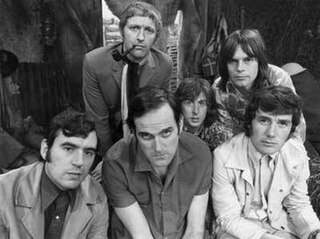
Monty Python were a British comedy troupe formed in 1969 consisting of Graham Chapman, John Cleese, Terry Gilliam, Eric Idle, Terry Jones, and Michael Palin. The group came to prominence for the sketch comedy series Monty Python's Flying Circus, which aired on the BBC from 1969 to 1974. Their work then developed into a larger collection that included live shows, films, albums, books, and musicals; their influence on comedy has been compared to the Beatles' influence on music. Their sketch show has been called "an important moment in the evolution of television comedy".

The "Dead Parrot Sketch", alternatively and originally known as the "Pet Shop Sketch" or "Parrot Sketch", is a sketch from Monty Python's Flying Circus about a non-existent species of parrot, called a "Norwegian Blue". A satire on poor customer service, it was written by John Cleese and Graham Chapman and initially performed in the show's first series, in the eighth episode.

"The Lumberjack Song" is a comedy song by the comedy troupe Monty Python. The song was written and composed by Terry Jones, Michael Palin, and Fred Tomlinson.
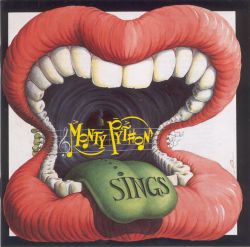
Monty Python Sings is a compilation album of songs by English comedy troupe Monty Python. Released in 1989 to celebrate their 20th anniversary, it contains popular songs from their previous albums and films. The album was dedicated to the memory of founding member Graham Chapman, who died two months before its release.
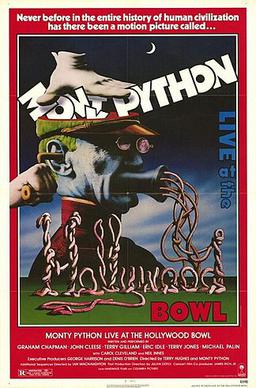
Monty Python Live at the Hollywood Bowl is a 1982 concert comedy film directed by Terry Hughes and starring the Monty Python comedy troupe as they perform many of their sketches at the Hollywood Bowl. The film also features Carol Cleveland in numerous supporting roles and Neil Innes performing songs. Also present for the shows and participating as an 'extra' was Python superfan Kim "Howard" Johnson.
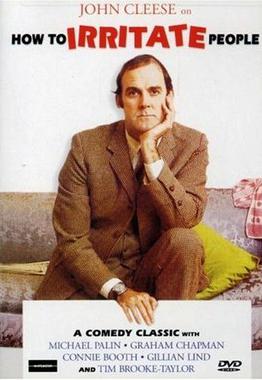
How to Irritate People is a US sketch comedy television broadcast recorded in the UK at LWT on 14 November 1968 and written by John Cleese, Graham Chapman, Marty Feldman and Tim Brooke-Taylor. Cleese, Chapman, and Brooke-Taylor also feature in it, along with future Monty Python collaborators Michael Palin and Connie Booth.
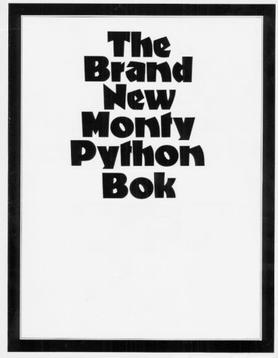
The Brand New Monty Python Bok was the second book to be published by the British comedy troupe Monty Python. Edited by Eric Idle, it was published by Methuen Books in 1973 and contained more print-style comic pieces than their first effort, Monty Python's Big Red Book.

Monty Python's Fliegender Zirkus is a pair of 45-minute Monty Python German television comedy specials produced by WDR for West German television. The two episodes were respectively first broadcast in January and December 1972 and were shot entirely on film and mostly on location in Bavaria, with the first episode recorded in German and the second recorded in English and then dubbed into German.

The Monty Python Instant Record Collection is the title of two compilation albums by the Monty Python troupe. The first was released in the UK and Canada in 1977 and drew from the group's first three studio albums, first live album, and first soundtrack album on the Charisma label, while the second was released in the US in 1981 and comprised tracks from their four albums released on the Arista label. Billed as "the pick of the best of some recently repeated Python hits again, Vol. II", the record sleeve was designed by Terry Gilliam. The UK/Canadian version originally featured packaging that folded out into a cardboard box resembling a large stack of record albums. An inner sleeve featured a spoof "Where Are They Now?" update on the members of the Python team.
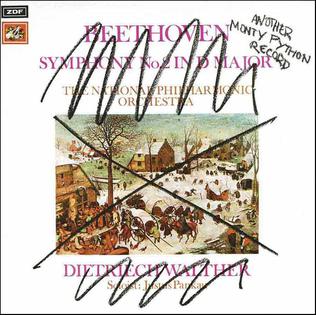
Another Monty Python Record is the second album produced by the Monty Python comedy group, released in 1971. Dissatisfied with their monaural BBC debut album released the previous year, the group took full control of the follow-up, which would be the first release of a six-album deal with Charisma Records in the UK. Most of the material is from the second BBC series of Monty Python's Flying Circus, with a few newly written pieces. One track, "Stake Your Claim", is an English-language version of a sketch from the team's first German episode.

"Argument Clinic" is a sketch from Monty Python's Flying Circus, written by John Cleese and Graham Chapman. The sketch was originally broadcast as part of the television series and has subsequently been performed live by the group. It relies heavily on wordplay and dialogue, and has been used as an example of how language works.

Monty Python's Previous Record is the third album by Monty Python. Released in 1972, it marked the group's first collaborations with regular sound engineer Andre Jacquemin as well as musician Neil Innes, who had previously appeared with future members of the Python team on Do Not Adjust Your Set. The album contains many sketches from the third series of Flying Circus, one from the second as well as an abridged version of "The Tale of Happy Valley" from the second German show. The album was released midway through the broadcast of Series 3, whose sketches featured on the album were all from its first half, with the exception of "Dennis Moore" which aired a month later and therefore made its debut here. The oldest sketch on the album, Eric Idle's "Radio Quiz Game", dates back to I'm Sorry, I'll Read That Again, where it was performed by Graeme Garden – Idle having subsequently performed the sketch himself on two editions of Do Not Adjust Your Set. The rest of the material was specially written for the album.

Monty Python's Life of Brian is the second soundtrack album by Monty Python, released in 1979 alongside the film of the same name. It contains scenes from the film interrupted by linking sections performed by Eric Idle and Graham Chapman, who also acted as producers following an aborted attempt at a soundtrack album by Michael Palin. The album opens with a brief rendition of "Hava Nagila" on Scottish bagpipes, which had earlier been considered for use in a scene later cut from the film.
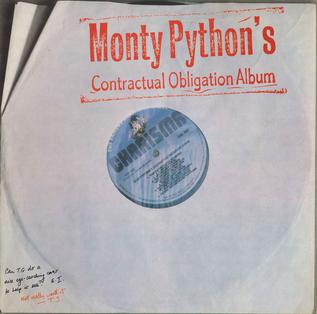
Monty Python's Contractual Obligation Album is the final studio album by Monty Python, released in 1980. As the title suggests, the album was put together to complete a contract with Charisma Records. Besides newly written songs and sketches, the sessions saw re-recordings of material that dated back to the 1960s pre-Python shows I'm Sorry, I'll Read That Again, The Frost Report, At Last The 1948 Show and How To Irritate People. One track, "Bells", dates from the sessions for Monty Python's Previous Record, while further material was adapted from Eric Idle's post-Python series Rutland Weekend Television. The group also reworked material written but discarded from early drafts of Life Of Brian, as well as the initial scripts for what would eventually become The Meaning Of Life.

Monty Python's Personal Best is a miniseries of six one-hour specials, each showcasing the contributions of a particular Monty Python member. Produced by Python (Monty) Pictures Ltd., the series first aired on PBS stations between 22 February and 8 March 2006, although the Eric Idle and Michael Palin episodes were initially released by A&E on two Region 1 DVDs in 2005; the remaining episodes were released in late February 2006.

"Eric the Half-a-Bee" is a song by the British comedy troupe Monty Python that was composed by Eric Idle with lyrics co-written with John Cleese. It first appeared as the A-side of the group's second 7" single, released in a mono mix on 17 November 1972, with a stereo mix appearing three weeks later on the group's third LP Monty Python's Previous Record. On this album, the song followed the routine called "Fish Licence" in which Mr Eric Praline, played by Cleese, tried to obtain a pet licence for an halibut and numerous other pets all named Eric, much to the chagrin of the licence office worker. One such pet is half a bee. The song relates the tale of the half-a-bee, having been "bisected accidentally" by his owner one summer's afternoon.
The Fish Licence is a sketch from Series 2 Episode 10 of the popular British television series, Monty Python's Flying Circus. It first aired on 1 December 1970.
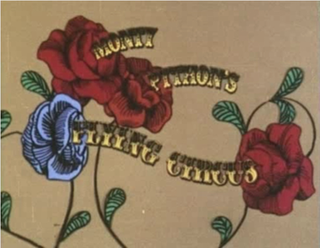
Monty Python's Flying Circus is a British surreal sketch comedy series created by and starring Graham Chapman, John Cleese, Eric Idle, Terry Jones, Michael Palin, and Terry Gilliam, who became known collectively as "Monty Python", or the "Pythons". The first episode was recorded at the BBC on 7 September 1969 and premiered on 5 October on BBC1, with 45 episodes airing over four series from 1969 to 1974, plus two episodes for German TV. A feature film adaptation of several sketches, And Now for Something Completely Different, was released in 1971.

Monty Python's Total Rubbish is a 2014 boxed set collecting remastered editions of the nine original albums of British comedy troupe Monty Python on nine CDs or ten LPs. It was released on 30 June 2014.

The Pythons Autobiography by The Pythons is the official autobiography of the Monty Python team, released in 2003. It covers the whole of Python history, from their childhoods all the way through to the 30th anniversary celebrations in 1999.




















